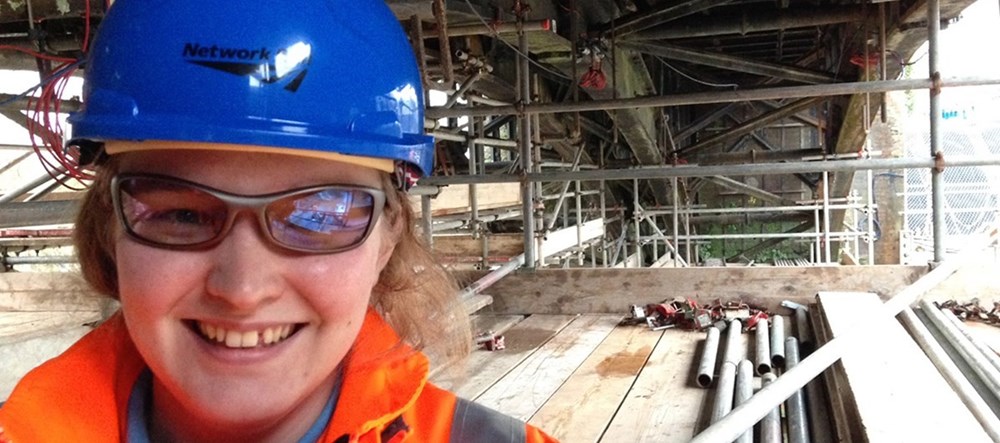My three most answered questions about engineering...
"It’s only when people start asking me about my role that they appreciate how interesting and challenging my job is" says Network Rail engineer Louise Bungay

Name: Louise Bungay
Age: 25
Job title: Asset Engineer (Structures)
Qualifications: Civil Engineering BEng (Hons)
University: Cardiff University
Employer: Network Rail
Where you live: Cardiff
When I tell people “I’m a civil engineer working in Asset Management at Network Rail”, I usually find a blank face staring back at me. I know that my job is exciting, but just reading that sentence over again makes me want to yawn!
It’s only when people start asking me about my role that they appreciate how interesting and challenging my job is. These are the main questions that I get asked:
• “What is asset management? You’re an engineer, why are you working in finance?”
• “What is civil engineering? Do you have to do a lot of manual labour? Is it dirty?”
• “Why and how did you get into engineering? It’s not really a girls’ job, especially on the railway.”
So, let’s try and answer some of these…
“Why are you working in finance?”
So many people think that I work for a bank, but it couldn’t be further from that! Working in asset management with Network Rail means that I look after railway infrastructure.
I work in a team who look after the structures (bridges, viaducts, walls, tunnels, culverts and sea defences). There are other teams who look after the track, the supporting earthworks, the signals, the stations, and everything in between.
There are five structures asset engineers in Wales, each looking after their own “patch” (there are far too many structures in Wales for one person – approx. 16000 at the last count!). My patch covers both main and local lines in to and through Wales, and I look after structures built by the pioneering Victorian railway engineers, all the way through to the modern structures built only a few months ago.
Asset management is all about sustainability – we look after our assets from the moment they are installed until they have reached their end of life, carrying out the correct maintenance where necessary.
It’s our responsibility to make sure that when you travel on a train, you get to your destination safely and on time.
“What is civil engineering?”
It’s not just hi-vis jackets and construction sites. That’s a part of it, but by no means all of it. To me, civil engineering is creative, inspiring, varied, live-changing and life-saving. Every aspect of your life is affected by civil engineering. Civil engineers make sure you have clean, safe drinking water; they make sure you have electricity; they ensure your journeys are safe; they design and build impressive bridges and buildings, life-saving flood defences, state-of-the-art waste facilities and almost everything else you can think of.
And it’s not just here. Civil engineers work throughout the world providing clean water and sanitation, or responding to devastating earthquakes and floods. Civil engineers are constantly pushing the limits of building materials and construction techniques.
“Why and how did you get into engineering? It’s not really a girls’ job, especially on the railway.”
The short answer is that my dad is to blame! He’s a highway engineer, and I can remember driving down a road as a child and him telling me he had designed that road. That stuck with me and, despite an interest in being a vet or a primary school teacher, that memory didn’t go. As I began to make my GSCE and A-Level choices, I made sure to keep maths and sciences in my choices so that I could study engineering at university. Engineering was for me, and I haven’t looked back.
Yes it’s true that as a girl I am outnumbered, but it’s a very common misconception that engineering, and the railway, are not places for women. Throughout university and since starting work, I have never felt out of place or been treated any differently because of my gender - I’ve been treated purely as an engineer.
There are some hard days when I’m stuck on site in the pouring rain in the middle of winter; or I’ve got to inspect a four mile tunnel in the middle of the night, wishing I could have chosen a different career; but I think situations like that would be challenging for anyone.
We all work together as a team, and having a mixture of men and women, all from different backgrounds, allows for a whole variety of thoughts and ideas to be discussed, with everyone treated with the respect they deserve.
So, hopefully now when I tell you my job title it doesn’t sound as boring as before! I know I’m biased, but being a civil engineer is a great job with so many opportunities all over the world. There will always be a new building being constructed or a bridge that needs looking after, and being able to tell someone “I worked on that” is a great feeling!
Useful links:
Careers at Network Rail
Engineering at Cardiff University